
We offer a broad range of A Level subjects, all of which are taught by our team of professional, UK (or equivalent) fully-qualified teachers.

The A Level in Art and Design has been designed to encourage an adventurous and enquiring approach to art and design. Successful students should be able to demonstrate an understanding of past and contemporary art and design practice and be able to produce artwork that embraces a range of ideas.
You will be encouraged to develop:

Both EDEXCEL Art & Design and Digital Photography courses are offered at A Level. Students opting for the above courses must have a strong background and advanced skills in Art & Design (a grade C GCSE or equivalent is required for either course).
You will work to the same assessment objectives as at GCSE and are given more time and freedom to explore your own interests in terms of subject matter as well as media and techniques. You will also have the advantage of a personal work space that is larger than those provided by most UK universities for both under and post-graduate students. Photography students have use of the lighting studio and are encouraged to become much more experimental in their attitude regarding what photography might be in terms of production and post production techniques.
In your second year, you will work independently and are required to set your own brief for the coursework module and write a 2000 word essay in parallel to work produced for your practical portfolio. This is a particularly exciting time if you have chosen to study an Art & Design related course at university as you can tailor your work to your professional interests and aspirations.
If you are interested in studying for a degree in one of the Art & Design disciplines such as fine art, digital media, product design and fashion design, you can go on to study on a foundation course for a year before choosing a specialism at degree level. Alternatively, you can choose to apply directly to your chosen degree, such as architecture, if already known.
Considering careers in engineering, science, medicine, law or business? Do you have a passion and flare for art or photography? Then you should seriously consider studying Digital Photography at A Level. The focus on problem solving, including rigorous academic research, visual and written analysis, open minded experimentation and critically aware decision making, equips prospective professionals with the attitudes, attributes and transferable skills required for success regardless of your chosen field.

The study of Biology aims to develop your understanding of biological facts, concepts and principles through experimental and investigatory work and independent research. Biology is an extremely varied and enjoyable subject. It requires a commitment to hard work and perseverance, but enables you to develop valuable and interesting knowledge and skills. As the A Level curriculum has evolved and developed, there has been an increasing emphasis on applied knowledge, data handling and interpretation.
Practical work is an integrated and assessed element of the course, with students developing key skills vital to a thorough understanding of how evidence is used to guide new ideas in Biology. The practical accreditation which is required by an increasing number of universities provides an excellent basis for study at higher education.
If you are opting for any science A Level you must have a strong background in (I)GCSE Sciences. A 6, 6 grade in Double Award Science or a 6 in Biology at (I)GCSE is therefore desirable, although grades lower than this will be considered on an individual basis.
Whilst mathematical study at a higher level is not essential, a minimum of a Grade 5 at (I)GCSE level is necessary to allow development of statistical tests used in Biology.
Our students who have studied this course have gone on to careers or courses in Medicine, Dentistry, Research, Genetics, Pathology, Physiotherapy, Sports Science, Physiology, Optometry, Law, Psychology, Pharmacology, Forensic Science, Agriculture, English, Engineering and Accountancy. Biologists are sought after graduates for their ability to quickly adapt to new and developing ideas.
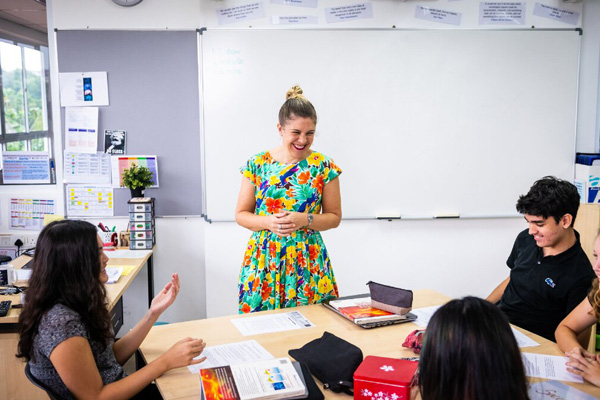
Business is offered by the Alice Smith School as a two year course leading to the full A Level qualification.
During the course you will gain a broad understanding of the business world and develop skills, knowledge and understanding related to topics such as business planning, finance, marketing and people in business.
You should choose Business Studies if the following questions interest you: What are the implications of Nike producing its goods in less developed countries? What are the important overseas markets for UK businesses to exploit? What are the characteristics of successful entrepreneurs? Why do some companies fail?
No previous study of the subject is required because the course assumes no prior knowledge. However, you should have a keen interest in learning about how businesses operate and have a lively and enquiring mind. If you have taken the (I)GCSE Business course you should have achieved at least a C grade. Strong Mathematical and English language skills would be a significant advantage given the topics studied and the nature of assessment.
The Business Studies A Level course combines well with almost all other A Level subjects. Students with an A Level in Business Studies have access to a wide range of career and higher education opportunities. Courses and careers where the study of business is obviously beneficial include accounting, marketing, personnel management and retailing.

The aim of this qualification is to stimulate and sustain your interest in, and enjoyment of, chemistry. It enables you to gain detailed knowledge and understanding of chemical reactions and to make connections and explain the inter-linking patterns, which are a distinguishing feature of this subject. You will develop an awareness of how chemists can influence the world we live in by considering its application in a social, economical, environmental and technological context. The course aims to recognise the value of chemistry to society and how it can be used responsibly. You will acquire practical skills and increase your level of independence in the laboratory. The practicals carried out illustrate the methodology employed to inform us about the theoretical topics studied in the course and lead on to the practical accreditation which is required by an increasing number of universities providing an excellent basis for study at higher education.
The Chemistry A Level option is a popular choice and has a strong practical emphasis exposing you to many opportunities for experiments using specialist laboratory equipment in dedicated chemistry laboratories.
A 6, 6 grade in Double Award Science or a 6 in Chemistry at (I)GCSE is expected, although grades lower than this will be considered on an individual basis.
Chemistry A Level is a requirement for university entry to medicine, chemical engineering or medical sciences. Specific degree courses include Chemistry, Environmental Science, Medicine, Dentistry, Veterinary Medicine, Chemical Engineering and Pharmacy. These are just a small selection of the courses that have a direct link to Chemistry, there are many others. Chemists are sought after graduates in the wider job market, not just in science related careers, due to their analytical and lateral thinking skills.
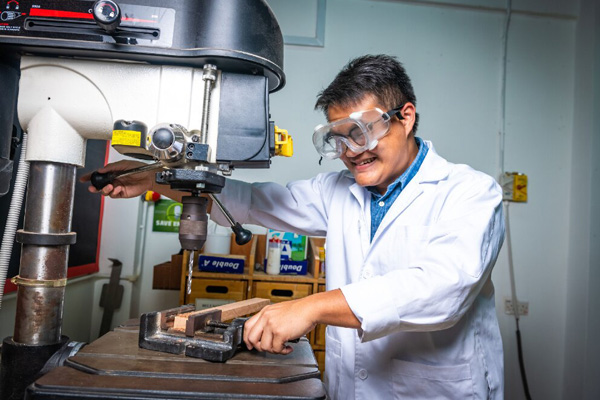
At A Level, you will formulate a real-life problem into a working brief alongside a client. You are encouraged to find this externally of the school. The product that you generate will be able to exist in the market place as a viable, functional commercial product. The ability to combine practical skills with an understanding of aesthetics, social and environmental issues, functional and industrial practices is essential for success.
The development of key Design Technology skills such as critical thinking, receptiveness to new ideas and an awareness of environmental technological advancements are key for any field of higher learning and position of responsibility or leadership.
If you are opting for this course, you should have a strong interest in Design Technology. Students following this level of study often choose to pursue a degree level course in various aspects of design from fashion to automotive or a similar field such as architecture or engineering at leading universities in the UK, US or Australia.

The content of the Edexcel A Level in Drama and Theatre Studies are specified within an open framework. This framework provides a balance across a range of learning activities. The specification combines the activities of exploring plays, creating theatre, the performing of plays, the analysis of theatre and the critical evaluation of all these elements. On successful completion of the course you will have a thorough understanding of drama and theatre, highly toned analytical and creative skills and an ability to communicate effectively with others.
You will engage in a range of theatre activities in order to appreciate the artistic aspects of the craft and will also be required to dedicate additional time for rehearsals and preparation of practical performances.
Drama and Theatre Studies A Level can lead to further study in Drama, Theatre Studies and Performing Arts in higher education at degree level. It can be used as part of your course to broaden your studies and may lead onto a career in the creative industries. The A Level complements a range of subjects and is useful in building confidence and improving presentation skills in a range of careers.
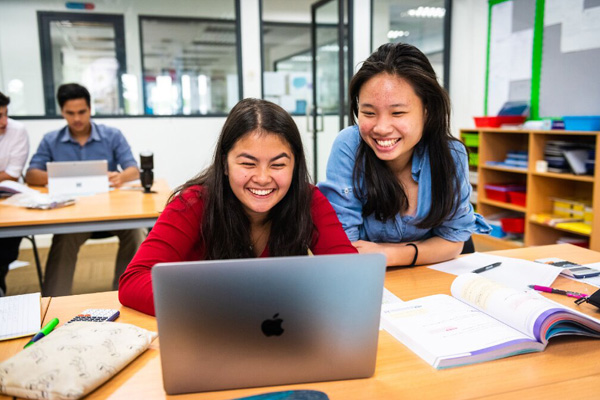
Economics is offered as a two year course leading to the full A Level qualification.
The study of Economics enables you to understand how the material resources of an individual, a community, a country and the world are managed. This course contributes to that understanding by enabling you to develop an appreciation of economic concepts and theories through a critical consideration of current economic issues, problems and institutions that affect everyday life.
No previous study of the subject is required because the course assumes no prior knowledge. If, however, the subject has been studied to GCSE then a minimum of a grade C is required. If the subject has not been studied before then a minimum of a grade C in both English Language and Mathematics is required (or equivalent qualifications)..) The course does require an interest in the economic and political world and a keenness to keep up to date with current affairs.
Economics is the ideal mixer subject at Sixth Form level. It combines well with all other subjects. It provides the foundation for the study of Economics, Business Studies, Accountancy and Law but an understanding of Economics is likely to prove useful in almost any industry from Hotel Management or Engineering to Product Design or the fashion industry.
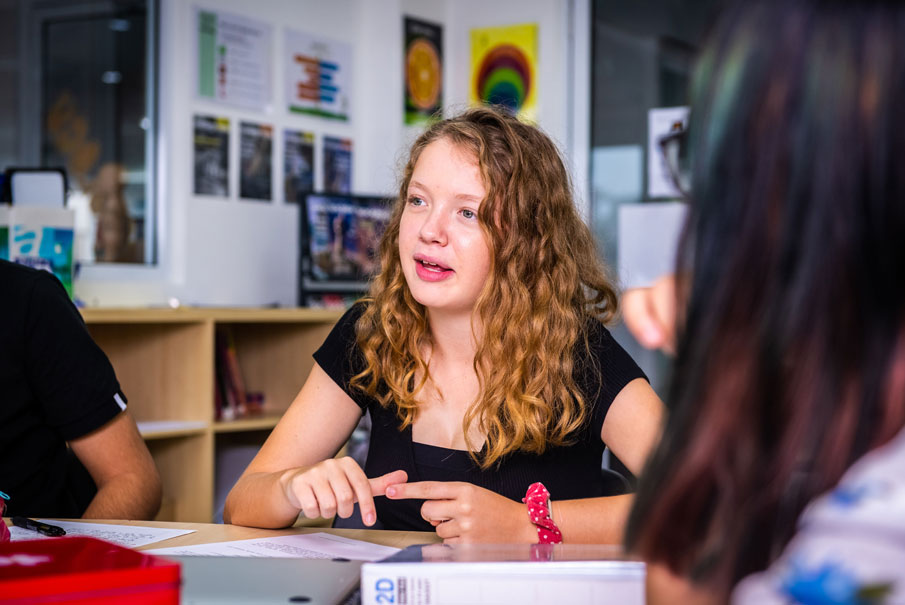
English Language is a challenging and varied course following on from the essential language analysis skills developed at (I)GCSE. Studying English Language enables you to look at real life issues and examine a wide variety of texts including spoken discourse. You will develop skills including critical analysis, independent thinking and research. The subject also offers the opportunity to craft and shape your own writing.
It is desirable that students embarking upon an English Language course have achieved at least a grade C in (I)GCSE English Language.
Students of English Language have a wide range of possible career and higher education opportunities. In particular A Level English Language can be extremely valuable if you wish to pursue a career in areas such as advertising, journalism, publishing, education, law, business and management to name just a few. You will learn, and use, a wide variety of transferable skills during the course. These include writing for a variety of purposes, responding to a wide range of texts using close analysis techniques, conducting independent research and the exploration of data.
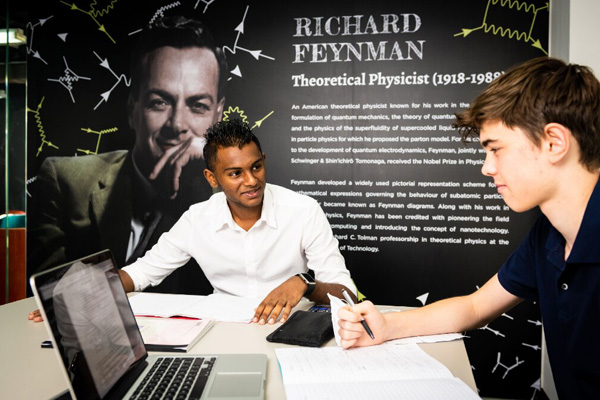
The English Literature A Level Course is inspiring and intriguing. It centres on different ways of reading and the connections that exist between texts within the literary genre of Tragedy. You will gain an understanding of how texts can be interpreted in multiple ways in order that you can arrive at your own interpretations and become confident autonomous readers .
Through discussion and creative collaborations in English Literature you will develop your skills of analysis and interpretation. You will master the skill of analytical essay writing, which is invaluable for many university degree courses and will also be able to use your creative skills in writing, role plays and presentations to your peers.
Due to the essay-based nature of assessment, we recommend that students have a GCSE Grade C or higher in English Language and English Literature.
English Literature A Level prepares students for progression into work or higher education in a range of areas such as Law, Business, International Relations, Journalism and Politics.
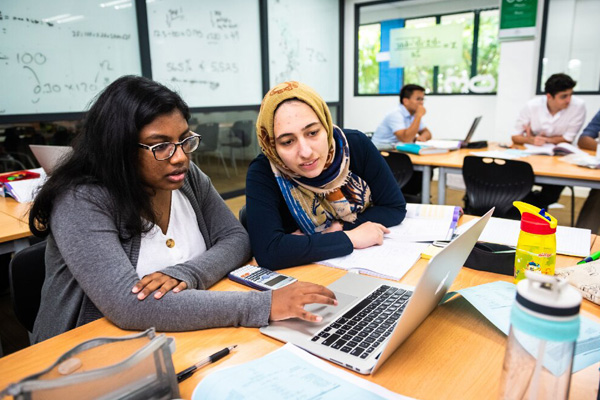
Further Maths is a potentially useful step towards preparation for studying STEM (Science, Technology, Engineering and Mathematics) degree courses and careers beyond school. It is a challenging qualification, which both extends and deepens your knowledge and understanding beyond the standard A Level Mathematics. As well as new learning new areas of pure mathematics, you will study further applications of mathematics in statistics and mechanics.
When studying Pure Mathematics you will be encountering more advanced topics such as matrix calculations and complex numbers. The all-important study of Mathematical proof will be extended to include a range of more rigorous techniques and both calculus and vectors will be studied at a more challenging level. The use of technology and graphical calculators will be an expected part of the course of study to equip you with appropriate skills for beyond the classroom.
In the Further Statistics module, you will develop your Mathematics work to include the Poisson distribution and more sophisticated hypothesis testing and in Further Mechanics the concepts are extended to include momentum, impulse, kinetic and potential energy and a closer look at Newton's Laws.
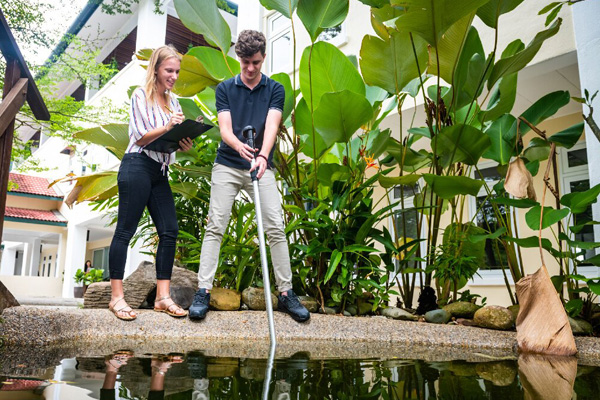
The world we live in is changing. Geography allows you to see how and why it is changing. The A Level course has been designed to attract students to a variety of topics that address key ideas and debates in our world today. Geography can enhance communication skills, literacy and numeracy, IT literacy, spatial awareness, team working, problem solving and environmental awareness. Practical work is an integral part of the course.
If you are opting for Geography we would recommend that you have at least a grade B in Geography at (I)GCSE level. You will need to have a lively and enquiring mind, an interest in the environment and current affairs, a willingness to explore new ideas, a keenness to research independently and an ability to communicate ideas effectively.
Geography combines well with almost all other A-level subjects. Taken with Science and Mathematics, it supports applications for almost any science-based university course like Engineering, Oceanography and Geology; taken with Arts and Humanities subjects like English, History and Economics, Geography supports courses such as Law, Environmental Management, Politics and Business. Since Geography develops the transferable skills that employers are looking for, it can lead to a range of opportunities such as Marketing, Social/Health Services, Advertising, Finance and Education

History is on the Russell Group’s list of facilitating subjects (subjects which give you the most choices post-16). The demand for History qualifications by universities and employers is down to the many high-level skills which form the foundation of the subject. Law, politics, government, civil service, business, teaching, heritage, museums, journalism, publishing, travel and tourism, computer gaming industry, historical research, archives are some of the careers that a qualification in History can lead to.
The Edexcel A Level History course challenges you to explore a breadth and range of content, concepts chronology and place. You will study four units: two in Year 12 and two in Year 13 to achieve your full A Level qualification. These are taught in parallel by different teachers. Three of the units are assessed through a formal examination and one unit is assessed through coursework.
If you are opting for History, we would recommend that you have at least a grade C at History (I)GCSE. You will need to have a lively and enquiring mind, an interest in current affairs, a willingness to explore new ideas, a keenness to research independently and an ability to communicate ideas effectively.
History students develop skills and knowledge applicable to a wide variety of jobs. These skills and knowledge include:
The subject is particularly useful for careers in: international relations, law, journalism, teaching, industrial relations, criminal justice work, policy development and implementation, research work, public relations, publishing, personnel work, training and many others.

Advances in computing and technology are transforming the way we work and live. The new Computer Science specification is designed to equip you with an in-depth understanding of Computer systems, the algorithmic processes and programming, hardware and software, the main principles of problem solving, the theory of computation and the application of data, information and knowledge. Computer science develops your computational and critical thinking skills and shows you how to create, not simply use, new technologies.
You would benefit from a GCSE in Computer Science at grade C or above, but it is not essential, and you should also have an interest in computational systems and problem solving and keep abreast of current technological advancement.
A good grade in Computer Science at A level is valued by universities and employers since it requires the development of analytical thinking and problem solving skills. This course also lays an appropriate foundation for further study of Computer Science, Engineering, Physics or related subjects in higher education. Many problems in the sciences, engineering, health care, business and other areas can be solved effectively with computers, but finding a solution requires both computer science expertise and knowledge of the particular application domain. Thus, computer scientists often become proficient in other subjects.

The study of a foreign language is an exciting and stimulating activity which promotes the development of a variety of personal skills. The ability to communicate in a foreign language brings a great sense of achievement as well as enhancing the understanding of other cultures, identities and communities.
We offer three A Level language courses in French, Mandarin and Spanish for students with a keen interest, enthusiasm and ability for language learning at a higher level. A Level students will develop an understanding of their chosen language in a variety of contexts and genres which enables them to communicate confidently, clearly and effectively in the language for a range of purposes. In addition to developing advanced communication skills, our A Level language courses also focus on the importance of awareness and understanding of the contemporary society, cultural background and heritage of countries or communities where the language is spoken. The courses encourage students to form their own opinions based on their study of the language in this broader context to enable them to take their place in a multilingual global society.
It is recommended that students embarking upon an A Level foreign language course have achieved at least a grade B or 6 in their chosen language at (I)GCSE Level or the equivalent.
Language A Levels are accepted entrance subjects at all universities. The higher learning of pure language at degree level leads to opportunities in Linguistics, Interpreting, Translation and Teaching. Any foreign language skill is a positive advantage in all job sectors globally, from International Relations and Politics, to Engineering, ICT and the Media.

Mathematics at A Level is a requirement for a wide variety of scientific and technological courses and careers. It may also be chosen to support other A Levels such as economics, geography, design and technology, ICT and, of course, the sciences. However, you should bear in mind that studying mathematics is also a unique experience in itself.
Mathematics at A Level covers 3 topic areas, pure maths, statistics and mechanics. You will study all three topic areas during this two-year A Level with final assessments in all material covered over the entire course.
When studying pure mathematics you will be extending your knowledge of topics such as algebra and trigonometry as well as learning some brand new ideas such as calculus. While many of the ideas met in pure mathematics are interesting in their own right, they also serve as an important foundation for other branches of mathematics, especially mechanics and statistics. The use of technology and graphical calculators will be an integral part of the course of study to equip you with appropriate skills for beyond the classroom.
When studying statistics you will learn how to analyse and summarise numerical data in order to arrive at conclusions about it. You will extend the range of probability problems looked at in (I)GCSE using the new mathematical techniques learnt in the pure mathematics units. Many of the ideas in this part of the course have applications in a wide range of other fields, from assessing car insurance costs to the likelihood the Earth receiving a comet strike in the next few years.
If you are opting for mathematics A Level you must have a strong background in (I)GCSE mathematics. To study mathematics at A Level it is highly recommended that students have a 7 grade or above at (I)GCSE level.
A huge variety of careers and degree courses now have some further study in mathematics as a base requirement. From architecture to zoology, including all sciences and medical disciplines, require mathematics. Any STEM (science, technology, engineering and mathematics) subject will require mathematics and it is also very beneficial for the study of many of the social sciences. In particular, mathematicians work in science-based industries and scientific research, in financial management, actuarial work, in software programming, in operational research, and in many commercial, industrial, public sector and research roles where they are in demand for their problem-solving, logical thinking and analytical skills.

Media studies is most definitely not about watching films and reading newspapers; it’s about actively engaging with media practice, theory and production. It’s about understanding the industries and business aspects of media production, as well as developing skills for further education and employment, such as research, critical thinking, teamwork and leadership.
At A Level, the focus is on engaging with actual media texts and understanding their impact on audiences and wider society. You are taught how to deconstruct texts and critique the implied ideologies they contain, considering the influence these may have on groups and individuals.
Due to the essay-based nature of assessment, we recommend that you have a GCSE Grade C or higher in English Language or GCSE Media Studies. The A Level is 50% exam based and 50% coursework based which allows you to experience carrying out research and planning and creating your own media productions in a way which reflects real media practice in the wider world.
Media-based courses are a popular choice at university, and many students have been successful in gaining places to study Film and Television Production, Journalism, Advertising and Marketing, Politics as well as any other courses at top universities in the UK and abroad.
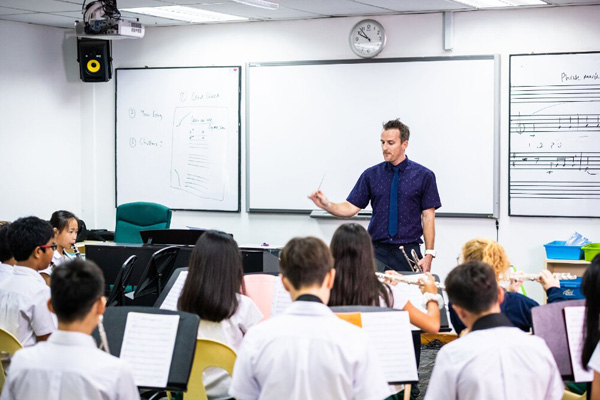
Music at A Level is challenging yet hugely rewarding, with a programme of study which suits performers as much as composers.
It is prerequisite that you must have taken GCSE Music (or an equivalent at Grade 6 or above), except in exceptional circumstances. You must be a competent performer, and be able to read music. It is also expected that you have already composed your own music before embarking on the course. It would be highly desirable, but not essential to have completed the ABRSM Grade 5 theory qualification as a starting point for the more technical and theoretical concepts covered in the course.
If you wish to take A Level Music and do not have GCSE Music you will need to discuss your intentions with the Head of Music to assess your suitability for the course, via an audition/ interview.
The A Level Music course will support you in forming personal and meaningful relationships with music through the development of musical knowledge, understanding and skills, including performing, composing and appraising. You will be encouraged to engage critically and creatively with a wide range of music and musical contexts, develop an understanding of the place of music in different cultures and contexts, and reflect on how music is used in the expression of personal and collective identities. This qualification will also allow you to develop particular strengths and interests, encourage lifelong learning and provide access to higher education and university degree courses in music and music-related subjects, as well as music-related and other careers.

The A Level specification in Physical Education will equip you with both a depth and breadth of knowledge, understanding and skills relating to scientific, socio-cultural and practical aspects of physical education.
If you are opting to follow this course you should have achieved a minimum grade C in Science and must be physically able and willing to learn through practical lessons. It is also expected that you will be competing in your chosen sport outside of school. It is preferable that you have taken GCSE PE before embarking upon the A Level, but not mandatory.
There are an extensive and diverse range of sports related degree courses offered by universities. These include; Applied Sports Science, Physiotherapy, Sports Management, Sport & Business, Sports Media and Physical Education Teacher/Lecturer.
Sports Science is an area that continues to develop at a rapid rate. Particular specialisms include; nutrition, biomechanics, psychology, physiology, performance analysis, technology, fitness & training, life coach and sport motivation.

Physics A Level is a very highly regarded course giving access to a wide range of further education courses and employment. It is a fascinating subject whereby you will study a diverse range of theories and developing ideas. During the course you will study the key areas of modern physics, and the units are designed to foster an interest in how the subject is applicable in a wide range of situations. Practical work is an integrated and assessed element of the course and you will develop key skills vital to a thorough understanding of how evidence is used to guide new ideas in Physics. The practicals carried lead on to the practical accreditation which is required by an increasing number of universities providing an excellent basis for study at higher education.
If you are opting for any science A Level, you must have a strong background in (I)GCSE Sciences. Grades 6, 6 or above in Double Award Science or a 6 in Physics is required for further study, although students with lower grades will be considered on an individual basis.
Whilst mathematical study at a higher level is now not essential for A Level Physics, the Physics course is very likely to make quite heavy demands on your mathematical capacity and so the study and use of mathematics is desirable.
A Level Physics is an important qualification for a huge range of careers, with many university degrees requiring it or seeing it as an advantageous qualification.
Some of the degrees that require Physics are Applied Physics, Astrophysics, Geophysics, Material technology, Forensic Science, Engineering, Meteorology, Medical Physics and is considered complementary for degrees in Medicine, Mathematics, Computing, Finance, Law, Accountancy and many more areas.

The AQA A Level syllabus offers an engaging and effective introduction to Psychology. The specification offers both structure and flexibility in that it focuses not only on core knowledge and understanding of the necessary theories and research in the various fields of Psychology, but it also puts much emphasis on how it is applied to the individual and society as well as assessing its efficacy. In so doing, it gives you the opportunity to study a variety of different areas and contemporary issues. It also allows study to be tailored to students’ needs and the contexts in which they are learning.
You will study the different perspectives within Psychology by looking at the Approaches (Social, Cognitive, Biological and Learning), as well as topics such and Social Influence, Attachments and Memory. In addition you will also look at Applied Psychology (Psychopathology) as well as investigating research methods in context at Advanced Subsidiary level to gain a foundation in psychology. You will be able to develop your understanding through a variety of applications, including Forensic, Gender and Clinical Psychology (Schizophrenia). You will also consolidate and further develop your understanding of the Approaches (Humanistic, Psychodynamic) and finally, develop a holistic understanding of psychology from considering conflicting and complementary explanations through Issues and Debates.
A practical focus is embedded within the specification. A series of short and manageable practical experiments and tests accompanies the syllabus, allowing you to develop an active knowledge of the scientific aspects of psychology alongside the relevant methodological and mathematical requirement for effective data analysis.
During the course you will need to be able to communicate effectively and research information from a variety of sources. It would assist you on the course if you have or are working towards GCSE Grade B in Mathematics, English and Science.
The study of Psychology can be used in many different careers and further education choices such as Law, Medicine, Business and Economics, Advertising, Sales, Industry, Biology, History, English as well as of course the field of Psychology itself.
Upon completing your A Levels, you will go on to study and contribute to diverse undergraduate courses, from the social sciences, law, humanities, media, design, architecture and the creative arts to the sciences, business, medicine and engineering.
The diversity of interests among our students is reflected in the vibrancy of our Sixth Form community as they grow into lifelong learners. Our belief that all learners are different is reflected in our various pathways through A levels, with the opportunity to add to A levels with the Extended Project Qualification.
The Extended Project Qualification is an exciting standalone qualification that encourages students to develop vital skills necessary in Higher Education; exploring a personal passion, whilst learning research and project management methods. Planning for, and producing, essentially a mini-thesis, the EPQ is worth 50% of an A level. Students choose whatever topic they like as long as it doesn’t overlap with their A level course content, thus developing their independence and critical thinking skills. Students choose their project format; either a 5,000 word report or an ‘artefact’ with a 1,000 word report.
The requirement to go above and beyond their academic studies ensures that students really have to stretch themselves beyond their syllabi; students often combine elements of personal interests with their future academic aspirations. Our students constantly amaze us with their creativity, curiosity and passion, as well as the way that they challenge themselves, developing university level research, citation and academic writing skills that will benefit them once they leave.
The culmination of the project is a presentation to fellow students, staff and guests in which each candidate must explain their journey through the research process. This is not simply a retelling of the project but a thorough evaluation of their learning as a researcher which shows their understanding of the reality of project-based working with regard to time-management, organisation, decision-making and problem-solving.
Universities value the skills learned in EPQ such as essay structure, time management and independent learning. It has directly influenced two of my university offers!
Eun Jae Kim, Year 13
The EPQ has been a valued part of the Alice Smith curriculum for a number of years and time after time we hear from alumni who have benefited greatly from having pursued it. Many students were able to access highly competitive university courses because of the distinctness that their EPQ topic brought to their application.